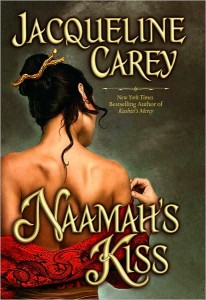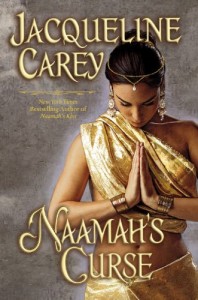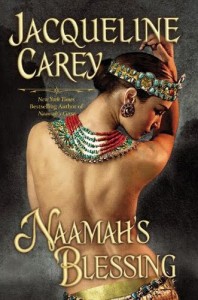“Naamah’s Kiss”, “Naamah’s Curse” and “Naamah’s Blessing” by Jacqueline Carey
 Yes, I’ve been reading a lot of Jacqueline Carey lately. (wait until I get to my Robin Hobb backlog – I’ve got four trilogies and a book of short stories to review…)
Yes, I’ve been reading a lot of Jacqueline Carey lately. (wait until I get to my Robin Hobb backlog – I’ve got four trilogies and a book of short stories to review…)
I don’t think there’s an official name for this trilogy, just “the Moirin trilogy”, but it’s the third trilogy in the Kushiel’s Legacy world (my review of the “Imriel trilogy“, and the individual books of the Phèdre trilogy: Kushiel’s Dart, Kushiel’s Chosen, and Kushiel’s Avatar.) It’s set a hundred years after the events of the previous books and features an entirely new protagonist – Moirin mac Fainche of the Maghuin Dhonn, who happens to be half D’Angeline. I pretty much have the same cricitisms and things I love for all three books, so I won’t be reviewing them separately.
Jacqueline Carey writes beautifully, I love the lush descriptions of her world, and I was really excited to see more of it – Ch’in, Bhodistan, Vralia, the Tatar steppes – even the New World! I thought the way Raphael ended up using Caim’s gift was ingenious. I love her subtle use of words, I love her characters, I love her twist on the “love conquers all” cliché. I can’t not enjoy a Kushiel’s Legacy book… but these books didn’t live up to the previous trilogies. Here’s why:

- Moirin’s diadh-anam: As a child of the Maghuin Dhonn, Moirin has a very convenient thing called a diadh-anam. Whenever Moirin has to make a decision, it’s simple – she consults her diadh-anam. If it’s leaping, she says yes. If it’s still, she says no. This always turns out to be the right choice, and this means Moirin never has any internal conflict and turns out to be a Mary Sue. Her diadh-anam even points her to the direction she needs to go in next – it gives the idiom “moral compass” a whole new meaning. Very occasionally, her diadh-anam is silent, but Moirin ends up making the right choice anyway, and it leaps afterwards
- Bao: Bao is the worst character. He’s absolutely unbelievable. In Naamah’s Kiss, he’s surly and resentful, although a good fighter and protective of his master. Then after a few months, Moirin realises that he’s beautiful? By book 2, he’s Moirin’s one true love and his character has changed completely – he’s now stubborn and confused, trying to figure out his feelings – kind of similar to Joscelin in Kushiel’s Chosen. In the third book, despite his ordeal at the end of the second, he’s suddenly a loving and patient husband – also like Joscelin in Kushiel’s Avatar – except he’s nowhere as awesome as Joscelin, and suffers by comparision. He should’ve been his own character – instead it seems like his character serves the plot rather than developing realistically.
- The white savior: Like I said above, Moirin is very much a Mary Sue. Wherever she goes, she ends up finding sympathetic ears and changing the face of the society. In Ch’in, Snow Tiger ends up defying her father (something that never happens) to save the realm. In Vralia, she converts a fundamentalist Yeshuite to see the power of love and inspires him to go preach about it. In Bhodistan, she persuades the Rani to abolish the castle system. In Nauhatl lands, she persuades the emperor to give up human sacrifice. Not only does this reduce the lands she visits into stereotypes, it’s just annoyin
 g! Phèdre and Imriel manage to save the world multiple times without falling into this trope – Phèdre visits Khebel-im-Akkad without effecting women’s emancipation and Menekhet without changing the Hellene perception towards natives. Imriel visits Caerdicci Unitas without changing the stigma against homosexuality. It’s made all the more annoying by Moirin’s observations about how she’s not as good as the legends Imriel and Phèdre.
g! Phèdre and Imriel manage to save the world multiple times without falling into this trope – Phèdre visits Khebel-im-Akkad without effecting women’s emancipation and Menekhet without changing the Hellene perception towards natives. Imriel visits Caerdicci Unitas without changing the stigma against homosexuality. It’s made all the more annoying by Moirin’s observations about how she’s not as good as the legends Imriel and Phèdre.
- Moirin herself: Okay, Moirin is not that bad – she’s just bland. She has very little internal conflict because her diadh-anam tells her what to do, she’s Naamah and Anael’s child, and that makes her desires a lot tamer than Kushiel’s chosen, so that part isn’t as much fun either. She had a lot of promise when she was a cave dwelling half-wild girl needing to understand D’Angeline society, but she figures that all out really quickly, which is boring. She’s just nice and kind and she has a destiny.
I still enjoyed the series, and if Carey wrote other books in this world, I’d pre-order them in an heartbeat. But I’d hope fervently they were more like the Phèdre and Imriel series’ than this one.
The Moirin trilogy is Naamah’s Kiss, Naamah’s Curse and Naamah’s Blessing.

Thank you for this post! I was SO irritated by Moirin the White Savior, so noticed that Bao was discount Joscelin and Master Lo was a walking Chinese stereotype. I liked her more than I liked Imrael, but wasn’t sure I wanted to go on. Since it sounds like the last two are more of the same, I think I’ll skip it. Thanks for saving me $$ and sanity!